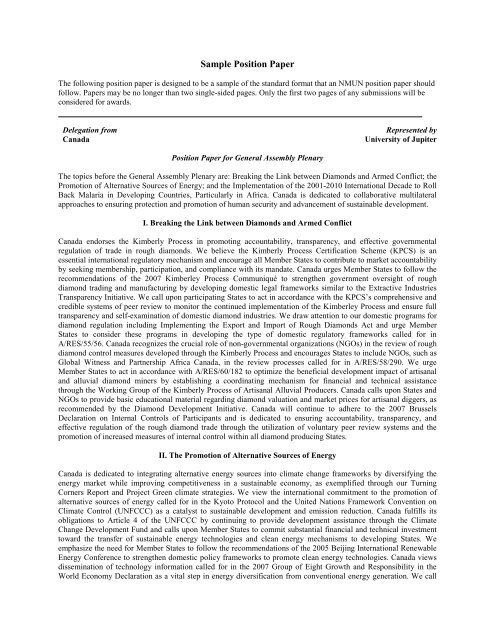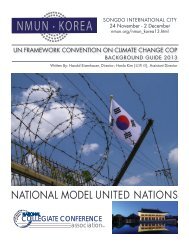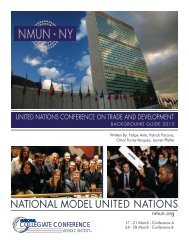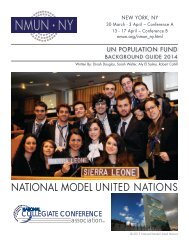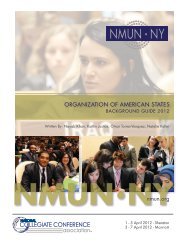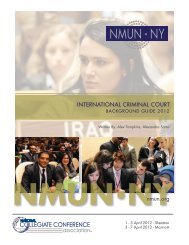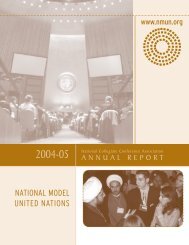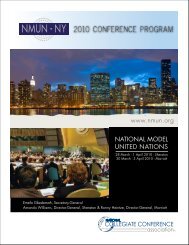Sample Position Paper - National Model United Nations
Sample Position Paper - National Model United Nations
Sample Position Paper - National Model United Nations
You also want an ePaper? Increase the reach of your titles
YUMPU automatically turns print PDFs into web optimized ePapers that Google loves.
<strong>Sample</strong> <strong>Position</strong> <strong>Paper</strong><br />
The following position paper is designed to be a sample of the standard format that an NMUN position paper should<br />
follow. <strong>Paper</strong>s may be no longer than two single-sided pages. Only the first two pages of any submissions will be<br />
considered for awards.<br />
Delegation from Represented by<br />
Canada University of Jupiter<br />
<strong>Position</strong> <strong>Paper</strong> for General Assembly Plenary<br />
The topics before the General Assembly Plenary are: Breaking the Link between Diamonds and Armed Conflict; the<br />
Promotion of Alternative Sources of Energy; and the Implementation of the 2001-2010 International Decade to Roll<br />
Back Malaria in Developing Countries, Particularly in Africa. Canada is dedicated to collaborative multilateral<br />
approaches to ensuring protection and promotion of human security and advancement of sustainable development.<br />
I. Breaking the Link between Diamonds and Armed Conflict<br />
Canada endorses the Kimberly Process in promoting accountability, transparency, and effective governmental<br />
regulation of trade in rough diamonds. We believe the Kimberly Process Certification Scheme (KPCS) is an<br />
essential international regulatory mechanism and encourage all Member States to contribute to market accountability<br />
by seeking membership, participation, and compliance with its mandate. Canada urges Member States to follow the<br />
recommendations of the 2007 Kimberley Process Communiqué to strengthen government oversight of rough<br />
diamond trading and manufacturing by developing domestic legal frameworks similar to the Extractive Industries<br />
Transparency Initiative. We call upon participating States to act in accordance with the KPCS’s comprehensive and<br />
credible systems of peer review to monitor the continued implementation of the Kimberley Process and ensure full<br />
transparency and self-examination of domestic diamond industries. We draw attention to our domestic programs for<br />
diamond regulation including Implementing the Export and Import of Rough Diamonds Act and urge Member<br />
States to consider these programs in developing the type of domestic regulatory frameworks called for in<br />
A/RES/55/56. Canada recognizes the crucial role of non-governmental organizations (NGOs) in the review of rough<br />
diamond control measures developed through the Kimberly Process and encourages States to include NGOs, such as<br />
Global Witness and Partnership Africa Canada, in the review processes called for in A/RES/58/290. We urge<br />
Member States to act in accordance with A/RES/60/182 to optimize the beneficial development impact of artisanal<br />
and alluvial diamond miners by establishing a coordinating mechanism for financial and technical assistance<br />
through the Working Group of the Kimberly Process of Artisanal Alluvial Producers. Canada calls upon States and<br />
NGOs to provide basic educational material regarding diamond valuation and market prices for artisanal diggers, as<br />
recommended by the Diamond Development Initiative. Canada will continue to adhere to the 2007 Brussels<br />
Declaration on Internal Controls of Participants and is dedicated to ensuring accountability, transparency, and<br />
effective regulation of the rough diamond trade through the utilization of voluntary peer review systems and the<br />
promotion of increased measures of internal control within all diamond producing States.<br />
II. The Promotion of Alternative Sources of Energy<br />
Canada is dedicated to integrating alternative energy sources into climate change frameworks by diversifying the<br />
energy market while improving competitiveness in a sustainable economy, as exemplified through our Turning<br />
Corners Report and Project Green climate strategies. We view the international commitment to the promotion of<br />
alternative sources of energy called for in the Kyoto Protocol and the <strong>United</strong> <strong>Nations</strong> Framework Convention on<br />
Climate Control (UNFCCC) as a catalyst to sustainable development and emission reduction. Canada fulfills its<br />
obligations to Article 4 of the UNFCCC by continuing to provide development assistance through the Climate<br />
Change Development Fund and calls upon Member States to commit substantial financial and technical investment<br />
toward the transfer of sustainable energy technologies and clean energy mechanisms to developing States. We<br />
emphasize the need for Member States to follow the recommendations of the 2005 Beijing International Renewable<br />
Energy Conference to strengthen domestic policy frameworks to promote clean energy technologies. Canada views<br />
dissemination of technology information called for in the 2007 Group of Eight Growth and Responsibility in the<br />
World Economy Declaration as a vital step in energy diversification from conventional energy generation. We call
upon Member States to integrate clean electricity from renewable sources into their domestic energy sector by<br />
employing investment campaigns similar to our $1.48 billion initiative ecoENERGY for Renewable Power. Canada<br />
encourages States to develop domestic policies of energy efficiency, utilizing regulatory and financing frameworks<br />
to accelerate the deployment of clean low-emitting technologies. We call upon Member States to provide<br />
knowledge-based advisory services for expanding access to energy in order to fulfill their commitments to Goal 1 of<br />
the Millennium Development Goals (MDGs). Canada urges States to address the concerns of the 2007 Human<br />
Development Report by promoting tax incentives, similar to the Capital Cost Allowances and Canadian Renewable<br />
and Conservation Expenses, to encourage private sector development of energy conservation and renewable energy<br />
projects. As a member of the Renewable Energy and Energy Efficiency Partnership, Canada is committed to<br />
accelerating the development of renewable energy projects, information sharing mechanisms, and energy efficient<br />
systems through the voluntary carbon offset system. We are dedicated to leading international efforts toward the<br />
development and sharing of best practices on clean energy technologies and highlight our release of the Renewable<br />
Energy Technologies Screen software for public and private stakeholders developing projects in energy efficiency,<br />
cogeneration, and renewable energy. Canada believes the integration of clean energy into State specific strategies<br />
called for in A/62/419/Add.9 will strengthen energy diversification, promote the use of cogeneration, and achieve a<br />
synergy between promoting alternative energy while allowing for competitiveness in a sustainable economy.<br />
III. Implementation of the 2001-2010 International Decade to Roll Back Malaria in Developing Countries,<br />
Particularly in Africa<br />
Canada views the full implementation of the treatment and prevention targets of the 2001-2010 International Decade<br />
to Roll Back Malaria in Developing Countries, Especially in Africa, as essential to eradicating malaria and assisting<br />
African States to achieve Target 8 of Goal 6 of the MDGs by 2015. We recommend Member States cooperate with<br />
the World Health Organization to ensure transparency in the collection of statistical information for Indicators 21<br />
and 22 of the MDGs. Canada reaffirms the targets of the Abuja Declaration Plan of Action stressing regional<br />
cooperation in the implementation, monitoring, and management of malaria prevention and treatment initiatives in<br />
Africa. To fully implement A/RES/61/228, Canada believes developed States must balance trade and intellectual<br />
property obligations with the humanitarian objective of the Doha Declaration on the TRIPS Agreement and Public<br />
Health. We continue to implement Paragraph 6 of the Doha Declaration on the TRIPS Agreement and Public Health<br />
into our compulsory licensing framework through the Jean Chrétien Pledge to Africa Act. We urge Member States<br />
to support compulsory licensing for essential generic medicines by including anti-malarial vaccines and initiating<br />
domestic provisions to permit export-only compulsory licenses to domestic pharmaceutical manufacturers, similar to<br />
Canada’s Access to Medicines Regime. Canada calls upon Member States to establish advanced market<br />
commitments on the distribution of pneumococcal vaccines to developing States in cooperation with PATH and the<br />
Malaria Vaccine Initiative. We emphasize the need for greater membership in the Roll Back Malaria initiative to<br />
strengthen malaria control planning, funding, implementation, and evaluation by promoting increased investment in<br />
healthcare systems and greater incorporation of malaria control into all relevant multi-sector activities. Canada<br />
continues to implement the Canadian International Development Agency’s (CIDA) New Agenda for Action on<br />
Health to reduce malaria infection rates among marginalized populations in Africa, increase routine immunizations<br />
rates, and reduce infection rates of other neglected infections. Canada will achieve the goal of doubling aid to Africa<br />
by 2008-2009 by providing assistance to the Global Fund to Fight Aids, Tuberculosis, and Malaria. We urge<br />
Member States to increase donations to intergovernmental organizations and NGOs that support malaria<br />
programming in Africa, exemplified by CIDA’s contribution of $26 million to the Canadian Red Cross. We<br />
continue our efforts to provide accessible and affordable vector control methods to African States through the Red<br />
Cross’ Malaria Bed Net Campaign and the African Medical Research Foundation Canada by supplying insecticidetreated<br />
mosquito nets and Participatory Malaria Prevention and Treatment tool kits.


